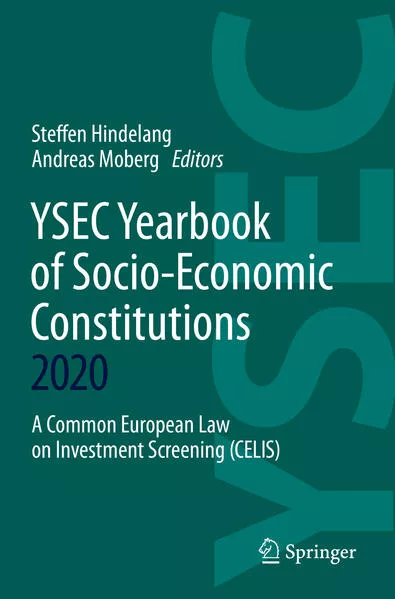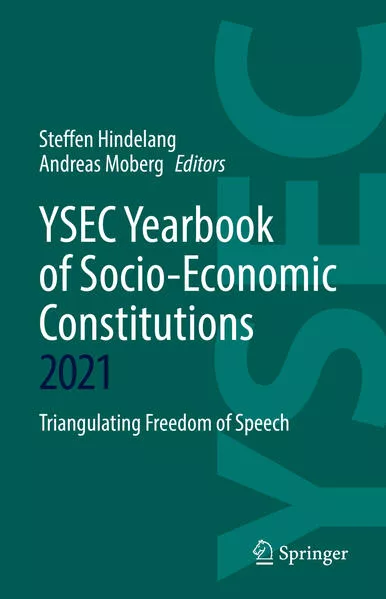YSEC Yearbook of Socio-Economic Constitutions
YSEC Yearbook of Socio-Economic Constitutions 2020
Chronologie aller Bände (1 - 2)
Die Reihenfolge beginnt mit dem Buch "YSEC Yearbook of Socio-Economic Constitutions 2020". Wer alle Bücher der Reihe nach lesen möchte, sollte mit diesem Band von Steffen Hindelang beginnen. Die Reihe umfasst derzeit 2 Bände. Der neueste Band trägt den Titel "YSEC Yearbook of Socio-Economic Constitutions 2021".
- Anzahl der Bewertungen für die gesamte Reihe: 1
- Ø Bewertung der Reihe: 5
- Start der Reihe: 12.06.2022
- Neueste Folge: 14.07.2023
- Band: 2020
- Autor: Hindelang, Steffen
- Anzahl Bewertungen: 1
- Ø Bewertung: 5.0
- Medium: Buch
- Veröffentlicht: 12.06.2022
- Genre: Politik
YSEC Yearbook of Socio-Economic Constitutions 2020
This book presents the very first, interdisciplinarily grounded, comprehensive appraisal of a future “Common European Law on Investment Screening”. Thereby, it provides a foundation for a European administrative law framework for investment screening by setting out viable solutions and evaluating their pros and cons.
Daimler, the harbour terminal in Zeebrugge, or Saxo Bank are only three recent examples of controversially discussed company takeovers in Europe. The “elephant in the room” is China and its “Belt and Road Initiative”. The political will in Europe is growing to more actively control investments flowing into the EU. The current regulatory initiatives raise several fundamental, constitutional and regulatory issues. Surprisingly, they have not been addressed in any depth so far. The book takes stock of the current rather fragmented regulatory approaches and combines contributions from leading international academics, practitioners, and policy makers in their respective fields. Due to the volume’s comprehensive approach, it is expected to influence the broader debate on the EU’s upcoming regulation of this matter.
The book is addressed to participants from academia as well as to representatives from government, business, and civil society.
- Band: 2021
- Autor: Hindelang, Steffen
- Anzahl Bewertungen: 0
- Ø Bewertung:
- Medium: Buch
- Veröffentlicht: 13.07.2022
- Genre: Politik
YSEC Yearbook of Socio-Economic Constitutions 2021
This volume addresses contemporary challenges, enabled by modern technology, that concern upholding freedom of speech where it conflicts with social rights, such as respect for private and family life, and with economic rights, such as the freedom to conduct business or the right to free movement.
In today’s networked world, technological shifts happen faster than most people even realize. Some of these shifts have made us all potentially powerful: media powerful. We used to sit in silence in front of newspapers and TV screens, and the world was explained to us by just a few sources. Today, thanks to the Internet, social media, and Web 2.0, we can not only share our own thoughts with everyone in a more self-determined way, but we can also take part in public debate and even co-shape it ourselves. Of course, the Internet is not a counter-design to the communication (power) structures of the past. Gains in communicative self-determination are threatened due to algorithmisation, platformisation, and value extraction from self-created private markets.At the same time, the empowerment of the individual challenges the old “grand speakers” who are suddenly detecting “fake news”, echo chambers, and filter bubbles everywhere on the Internet. Internet-based communication allegedly hinders us from the “one truth”; as if newspaper hoaxes, propaganda, and narrow-mindedness were an invention of the Internet. The current heated debate over “fake news”, copyright, and “upload filters” shows that we are unsure of how to deal with the newer and more complex phenomena of Internet-based speech. This is due in no small part to the fact that an important benchmark – our constitutional compass – is still firmly rooted in the past. Constitutions change far more slowly than technologies. Societal changes can drive constitutional changes; but what about normative content control?
Today, there are already demands for “old-school clarity”: truth filters on social media platforms, horrendous sums of liability for platforms that encourage (overly)thorough cleaning up. However, it is equally true that private individuals “regulate”: they decide what is found on the Internet and who may post on a given platform. Accounting for all interests at play and striking a “fair” balance that avoids both a public and private over- and under-regulation is a complex matter. The authors of this volume not only provide reflections in their highly topical contributions, but also share their understanding of what constitutes a fair balance within the larger frame of freedom of speech in a digital age.

